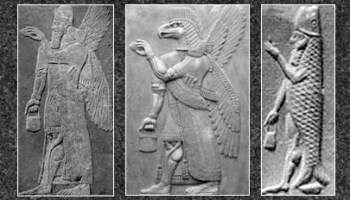We conclude considering a paper written by Estonia’s University of Tartu’s Amar Annus, “On the Origin of Watchers: A Comparative Study of the Antediluvian Wisdom in Mesopotamian and Jewish Traditions,” Journal for the study of the Pseudepigrapha, Vol 19.4 (2010 AD): 277-320 (find my series here).
Amar Annus notes:
[The] tradition of the deluge from Mesopotamia survives in the version of the Erra Epic, where Marduk sent the sages down into the Apsu [the Ocean of Wisdom] as a consequence of the flood, and ordered them not to come up again (I 147)…demonic creatures were also often thought to have their origin in the depths of the divine River…like the Watchers, the Mesopotamian apkallus were punished by a flood according to the Erra Epic. In 1 Enoch, the flood was considered final judgment for the fallen angels.

Job 26:5 states, “Dead things are formed from under the waters, and the inhabitants thereof” with dead being rapha’ (Strong’s H7496) which is indeed, translated as the dead the eight times it appears in the Bible.
Now, there is another rapha’ (Strong’s H7497) which makes 25 appearances in contextual reference to a tribe of giants. Of interest may be Deuteronomy 2:10-11 “The Emims dwelt therein in times past, a people great, and many, and tall, as the Anakims; which also were accounted giants, [H7497] as the Anakims; but the Moabites call them Emims” and verse 20 stating, “giants H7497 dwelt therein in old time; and the Ammonites call them Zamzummims.”
Both rapha’ words, for dead and giants, derive from yet another rapha’ word (Strong’s H7495) which occurs 62 times as a primitive root with reference to “to mend (by stitching), i.e. (figuratively) to cure:—cure, (cause to) heal, physician, repair, thoroughly, make whole.” In turn, this rapha’ derives from the primitive root raphah (Strong’s H7503), “to slacken (in many applications, literal or figurative):—abate, cease, consume, draw (toward evening), fail, (be) faint, be (wax) feeble, forsake, idle, leave, let alone (go, down), (be) slack, stay, be still, be slothful, (be) weak(-en).”
The Bible ties the Genesis 6 affair directly to the flood as 6:4 refers to “when the sons of God came in unto the daughters of men, and they bare children to them, the same became mighty men which were of old, men of renown” and verse 5 follows directly with “And GOD saw that the wickedness of man was great in the earth, and that every imagination of the thoughts of his heart was only evil continually” with verse 7 noting, “And the LORD said, I will destroy man whom I have created from the face of the earth; both man, and beast, and the creeping thing, and the fowls of the air; for it repenteth me that I have made them.”
Annus notes that “Watchers and apkallus were able to survive the flood by assuming a different form” and that “The witches and demons in Mesopotamian mythology were not fully destructible because of their partly divine nature.” The Book of Enoch 15:8-9 elucidates how the Watchers “survive the flood by assuming a different form”:
But now the giants who were begotten by the spirits and flesh—they will call them evil spirits of the earth, for their dwelling will be on the earth. The spirits that have gone forth from the body of their flesh are evil spirits, for from humans they came into being, and from the holy watchers was the origin of their creation. Evil spirits they will be on the earth, and evil spirits they will be called.
Also, the text Bit Meseri, “enumerates all names of the apkallus, both antediluvian and postdiluvian” which some may equate with Genesis 6’s reference to there being “giants in the earth in those days; and also after that, when the sons of God came in unto the daughters of men” and yet, the questions are when are “those days” and “after” what? Some simply stated that it is a reference to pre and post flood but it may be a reference to specifically “when the sons of God came in unto the daughters of men” and after that and yet, the after that still being pre-flood.
Amar Annus also notes “The prison, where the spirits of the fallen angels are kept, is a chasm…an abyss…the netherworld in Mesopotamian texts.”
2 Peter 2:4 states that “God spared not the angels that sinned, but cast them down to…” and a word that most translations have as hell and yet, the term is Tartarus, technically, tartaroo (Strong’s G5020) which only appears in the Bible once.
~~~~~~~~~~~~~~~~~~~~~~~~
A plea: I have to pay for server usage and have made all content on this website free and always will. I support my family on one income and do research, writing, videos, etc. as a hobby. If you can even spare $1.00 as a donation, please do so: it may not seem like much but if each person reading this would do so, even every now and then, it would add up and really, really help. Here is my donate/paypal page.
Due to robo-spaming, I had to close the comment sections. However, you can comment on my Facebook page and/or on my Google+ page.
Twitter: #AmarAnnus, #Watchers, #Nephilim
Facebook: #AmarAnnus, #Watchers, #Nephilim
